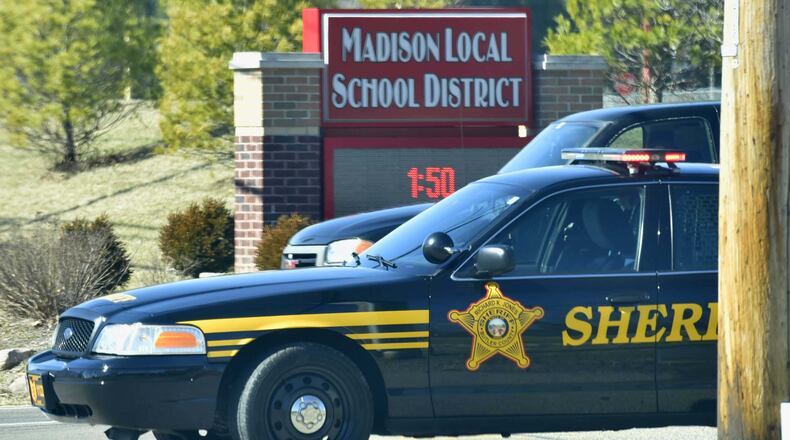The school board enacted a policy two years later that allows 10 staffers to carry weapons on campus, if they have 24-hour FASTER (Faculty/Administrator Safety Training and Emergency Response) gun safety training, in addition to the eight-hour training to obtain a concealed carry license, among other requirements.
Erin Gabbard and a few other parents sued the district in September 2018 seeking an injunction blocking the district from allowing teachers and other staff to carry guns without the training required of law enforcement officials — 728 hours versus the 24 hours the school has in its policy.
Retired Common Pleas Court Judge Charles Pater ruled teachers and other staff are not peace officers and therefore do not require police levels of training. The appeals court disagreed and ordered the school district to stop the program without much more involved training. The school district appealed to the high court last year.
The court heard from three attorneys Tuesday: Matthew Blickensderfer, the school district attorney, Assistant Attorney General Kyser Blakely, on behalf of the school district, and Rachel Bloomekatz, the parents’ attorney. They argued before the court for 90 minutes, longer than the usual 60-minute debate.
“If Gabbard is correct, then authorized teachers would essentially have to become police officers in order to carry a firearm,” Blakely said. “You are required to go through training and it’s not just directed at firearm safety which is important, but it is also directed at traffic training, 125 hours of field sobriety training, car crashes, 24 hours of driving a patrol car; 12 hours of human trafficking, 12 hours domestic violence and so on. It would be really surprising if the general assembly had wanted school districts to allow teachers to carry firearms but only if they are police officers.”
Blickensderfer told the court the hope is that the armed staff will “never ever” have to draw their weapons, so they should be considered the “backstop” in a critical situation, not security personnel.
Chief Justice Maureen O’Connor appeared very focused on the fact there are many districts in the state that, unlike Madison, do not have the money to hire certified security personnel.
“What about the school district that doesn’t have a security officer or a special police officer or a resource officer, all they have is the armed Algebra teacher,” O’Connor said adding in that instance the teacher’s role is transformed. “In other words, they’re the designee at that school, that takes them out of the realm of just being your average teacher and puts them into the classification of being the backstop.”
Bloomekatz focused her arguments on the fact to her view the language in the statutes is plain and the court should not read more into the meaning than is there.
“The fact of the matter is this court luckily doesn’t have to choose, doesn’t have to write the statute itself because the legislature already did,” Bloomekatz said. “The legislature already explained in plain language that this training requirement applies when a school employs a person, not just as a special police officer, not just as a security guard but also in another position in which person goes armed while on duty.”
Justice Sharon Kennedy, who is from Butler County, said there are two separate statutes at issue. One is enabling school gun policies and the other discusses training shouldn’t be intertwined. She said the law allowing school gun policies basically removes criminal liability.
“I’m just saying you, carry-concealed permit holder, you are now permitted to bring your gun into school,” she said. “The job hasn’t changed, you have no enforcement provisions, you’re not doing investigations, citing the criminal code, you’re not doing anything like that... How does that relief of a criminal prohibition somehow change you into a police officer.”
About the Author

